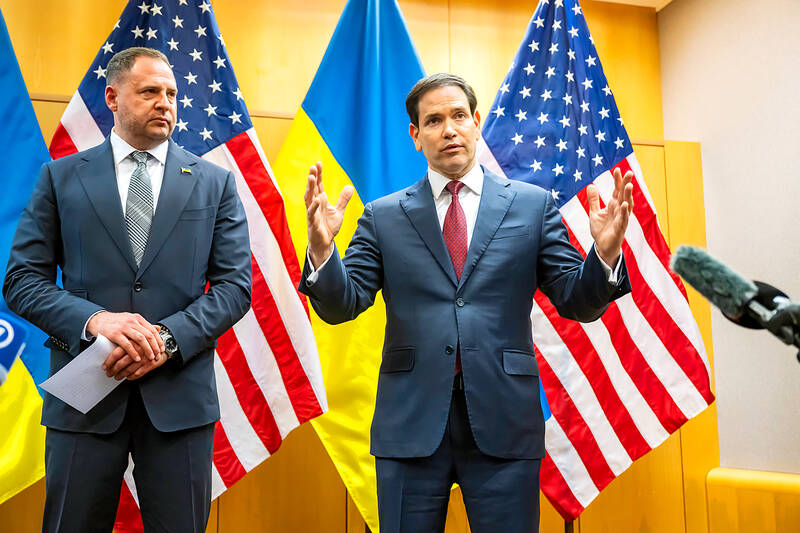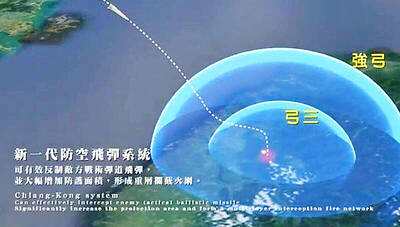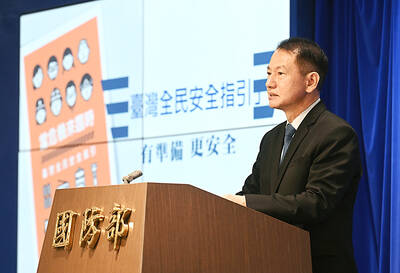Germany yesterday said that Russia has to be present at talks on ending the Ukraine war as Europe and Kyiv pressed for more work on a US proposal seen as heavily favoring Moscow.
Ukrainian, US and European officials met in Switzerland on Sunday to draft an “updated” plan after a 28-point proposal tabled by Washington on ending the Russian invasion was decried as an effective capitulation by Kyiv.
At an EU-Africa summit in Angola, where emergency talks on the US proposal completely overshadowed proceedings, German Chancellor Friedrich Merz said that Russia must be involved in any talks.

Photo: EPA
“The next step must be: Russia must come to the table,” Merz said. “If this is possible, then every effort will have been worthwhile.”
A new version of a draft worked on in Geneva, Switzerland, has not been published, but all sides agreed that any deal must “uphold Ukraine’s sovereignty.”
US President Donald Trump initially gave Ukrainian President Volodymyr Zelenskiy until Thursday to respond to the plan that would see Ukraine give up territory it controls, cap the size of its army and permanently close the door on NATO membership.
Merz threw doubt on Trump’s deadline, saying discussions would be a “lengthy, long-lasting process.”
“I don’t expect a breakthrough this week,” he said.
In a sign of the sensitivities involved, Polish Prime Minister Donald Tusk said: “The issue is delicate because nobody wants to put off the Americans and President Trump.”
Zelenskiy yesterday said that his country was at a “critical moment,” after last week insisting Ukraine risked losing either its “dignity” or Washington as an ally.
“To achieve real peace, more, more is needed. Of course we all continue working with partners, especially the United States, and look for compromises that strengthen, but not weaken us,” he said.
Russian President Vladimir Putin has said the original US plan could be a basis for a deal. His country’s invasion has devastated eastern Ukraine, forced millions to flee their homes, ravaged towns and cities, and killed tens of thousands in Europe’s worst conflict since World War II.
As talks continued, the war ground on.
Russia, which has fired a record numbers of missiles and drones, yesterday claimed another southern Ukrainian village. A Russian drone strike on the Ukrainian city of Kharkiv late on Sunday killed four people and caused widespread damage, officials said.
The issue of territory remained a major problem in the talks, Zelenskiy said.
“Putin wants legal recognition for what he has stolen,” the Ukrainian leader said.
EU chiefs hailed progress toward a deal, but also said that there were outstanding issues to resolve.
“There is a new momentum in peace negotiations,” European Council President Antonio Costa said on the sidelines of the summit in Angola.
“While work remains to be done, there is now a solid basis for moving forward,” European Commission President Ursula von der Leyen said.
Putin last week welcomed the first US plan, and Washington faced accusations that Moscow helped draft it. In a call with Turkish President Recep Tayyip Erdogan yesterday, the Russian leader repeated his view that the initial US plan could “serve as a basis for a final peace settlement.”
The Kremlin said it had not been informed on the results of the Geneva talks, but that it was aware that “adjustments” were made to the US proposal.

LIMITS: While China increases military pressure on Taiwan and expands its use of cognitive warfare, it is unwilling to target tech supply chains, the report said US and Taiwan military officials have warned that the Chinese People’s Liberation Army (PLA) could implement a blockade within “a matter of hours” and need only “minimal conversion time” prior to an attack on Taiwan, a report released on Tuesday by the US Senate’s China Economic and Security Review Commission said. “While there is no indication that China is planning an imminent attack, the United States and its allies and partners can no longer assume that a Taiwan contingency is a distant possibility for which they would have ample time to prepare,” it said. The commission made the comments in its annual

DETERMINATION: Beijing’s actions toward Tokyo have drawn international attention, but would likely bolster regional coordination and defense networks, the report said Japanese Prime Minister Sanae Takaichi’s administration is likely to prioritize security reforms and deterrence in the face of recent “hybrid” threats from China, the National Security Bureau (NSB) said. The bureau made the assessment in a written report to the Legislative Yuan ahead of an oral report and questions-and-answers session at the legislature’s Foreign Affairs and National Defense Committee tomorrow. The key points of Japan’s security reforms would be to reinforce security cooperation with the US, including enhancing defense deployment in the first island chain, pushing forward the integrated command and operations of the Japan Self-Defense Forces and US Forces Japan, as

INTERCEPTION: The 30km test ceiling shows that the CSIST is capable of producing missiles that could stop inbound missiles as they re-enter the atmosphere Recent missile tests by the Chungshan Institute of Science and Technology (CSIST) show that Taiwan’s missiles are capable of intercepting ballistic missiles as they re-enter the atmosphere and pose a significant deterrent to Chinese missile threats, former Hsiung Feng III missile development project chief engineer Chang Cheng (張誠) said yesterday. The military-affiliated institute has been conducting missile tests, believed to be related to Project Chiang Kung (強弓) at Pingtung County’s Jiupeng Military Base, with many tests deviating from past practices of setting restriction zones at “unlimited” and instead clearly stating a 30.48km range, Chang said. “Unlimited” restrictions zones for missile tests is

PUBLIC SAFETY: The nationwide distribution campaign aims to enhance society’s overall understanding of threats and bolster defense awareness, an official said The latest edition of the National Public Safety Guide is being mailed to all citizens starting today to foster public awareness of self-defense in the event of war or natural disasters, the Ministry of National Defense said yesterday. “The guides will be disseminated to the public to enhance society’s overall understanding of threats and bolster defense awareness, demonstrating the government’s emphasis on people’s safety and its determination to pursue self-defense,” All-out Defense Mobilization Agency Director Shen Wei-chih (沈威志) said at the ministry’s news conference. The nationwide distribution campaign was planned according to President Lai William’s (賴清德) Sept. 20 directive, he said, adding